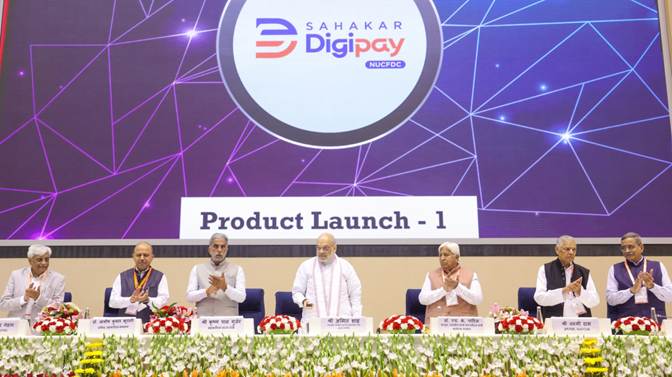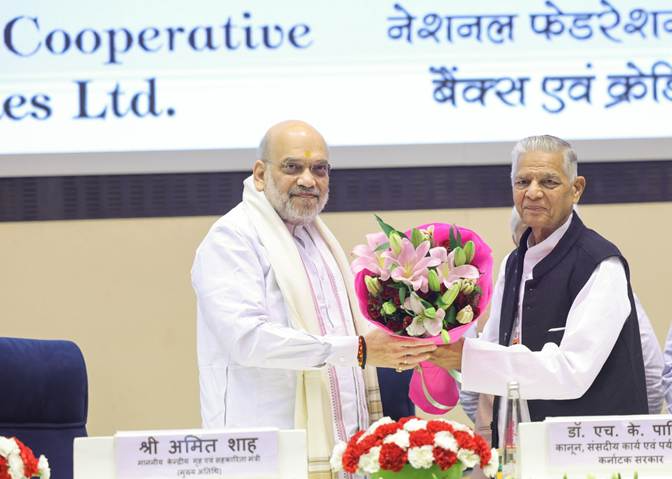1 UCB Will Be Set Up In Each City Within Next 5 Years: Amit Shah

FinTech BizNews Service
Mumbai, November 11, 2025: The Union Home Minister and Minister of Cooperation, Shri Amit Shah, on Monday addressed the international conference on the urban cooperative credit sector, ‘Co-Op Kumbh 2025’ in New Delhi as the Chief Guest. On this occasion, the Union Minister of State for Cooperation, Shri Krishan Pal Gurjar, the Secretary of the Ministry of Cooperation, and several other dignitaries were present.

In his address, Union Home Minister and Minister of Cooperation, Shri Amit Shah, said that the Cooperative Kumbh of urban cooperative banks and credit societies is being organized to mark the International Year of Cooperatives. He said that over the past 3–4 years, the country’s urban cooperative banking sector and cooperative credit society sector have been moving forward with renewed enthusiasm. He added that during Co-Op Kumbh 2025, there will be discussions on policy, technology, and innovation to tap several possibilities related to this sector. He said, the ‘Delhi Declaration 2025’ of the international conference organized by NAFCUB will serve as a roadmap for the expansion of Urban Cooperative Banks.
Shri Amit Shah said that through Co-Op Kumbh 2025, our dream of expanding urban cooperative banks will be fulfilled very soon. He said that today, Sahkar Digi-Pay and Sahkar Digi-Loan have been launched here by the umbrella organization. Through the Sahkar Digi-Pay app, even the smallest urban cooperative banks will be able to offer digital payment facilities.
Union Home Minister and Minister of Cooperation said that since the establishment of the Ministry of Cooperation, the Modi government has taken several important policy decisions to bring about fundamental changes in every sector related to cooperatives. Along with this, many steps have also been taken to modernize the cooperative sector, resolve its challenges, and expand the reach of cooperatives. He said that all state governments in the country have accepted the model bylaws for PACS.
Shri Amit Shah said that the Ministry of Cooperation has set four goals. The first is the development of Generation Sahakar, meaning connecting the young generation with the cooperative movement. For this, the Tribhuvan Sahkari University has been established, which will meet every kind of need in the cooperative sector. He said, another goal is to prepare cooperative societies that are capable of facing all kinds of challenges. He added that the government has also set a target of establishing one urban cooperative bank in every city with a population of more than two lakh within five years. Shri Shah said that urban cooperative banks must carry out their core functions with a multi-sector approach for the empowerment of young entrepreneurs, self-help groups, and weaker sections of society. He said, our goal is to strengthen cooperatives and, at the same time, to strengthen the weaker sections, and no institution other than urban cooperative banks can achieve this. He said that empowering vulnerable individuals through urban cooperative banks must also be one of our goals.
Union Minister of Cooperation said that in the past two years, we have succeeded in reducing Non-Performing Assets (NPA) from 2.8% to 0.06%. Along with this, we must improve operational standards and further strengthen the improvements achieved in financial discipline. Establishing one urban cooperative bank in every city will be possible only when we work toward converting cooperative societies into banks. He said that Gross Domestic Product (GDP) figures alone cannot reflect our progress; along with them, we must also ensure that every person gets some work and that their standard of living improves, which cannot happen without cooperatives. Shri Shah said that the Government of India and all state governments fully understand the concept and importance of cooperatives, and now there is a need to work with renewed confidence and effort in a transparent and result-oriented manner.
Shri Amit Shah said that the International Cooperative Alliance has placed Amul at the first position and IFFCO at the second position in the global ranking. This shows that even today, the idea and culture of cooperatives have not become outdated. Amul has become the driver of the White Revolution in the country, and through its 3.6 million farmer members, 18,000 village societies, and 18 district unions, it collects 30 million liters of milk every day across India. He said that in the year 2024–25, Amul’s turnover crossed 90,000 crore rupees, which shows that 3.6 million farmers, more than 65 per cent of whom are women, have together been successfully running such a large cooperative for so many years with small individual contributions. Shri Shah added that this reflects the vast potential available for cooperatives in our country.
Union Minister of Cooperation said that IFFCO has secured the position of the second-largest cooperative organization in the world. IFFCO has recorded a turnover of 41,000 crore rupees and a profit of 3,000 crore rupees. He said that IFFCO is a society of cooperative societies, and across the country, 35,000 cooperative societies, most of which are Primary Agricultural Credit Societies (PACS) and marketing-related societies, are its members. Through these societies, more than 5 crore farmers have become members of IFFCO, and today IFFCO has become a pillar of India’s Green Revolution by producing 93 lakh metric tonnes of urea and DAP. He added that IFFCO’s nano urea and nano DAP are now being exported to 65 countries, including Brazil, Oman, the United States, and Jordan.
Speaking about the products, Shri Jyotindra Mehta, Chairman, National Urban Co-operative Finance and Development Corporation, (NUCFDC), said, “India’s 1,400-plus Urban Co-operative Banks serve over 9 crore customers across the country through a network of nearly 11,500 branches. They play a vital role in advancing financial inclusion, yet many continue to face challenges in adopting secure and scalable digital systems. To remain trusted and competitive, UCBs must become digitally strong while upholding their core values of trust and transparency.
NUCFDC’s product suite is designed to bridge this gap by offering affordable, future-ready solutions that strengthen governance and service delivery. These innovations will empower UCBs to deliver faster, smarter, and more secure financial services, making them self-reliant and driving their growth.”
Shri Prabhat Chaturvedi, CEO, NUCFDC, said, “The products are designed to simplify digital transformation for UCBs, with each addressing a specific operational challenge. These solutions minimize manual intervention, improve turnaround time, and ensure regulatory compliance. Built for long-term digital resilience, they mark a decisive step toward making UCBs more confident and efficient. It is an important milestone in the digital evolution of India’s Urban Co-operative Banking sector, enabling UCBs to become more competitive and resilient in a fast-changing financial landscape.”